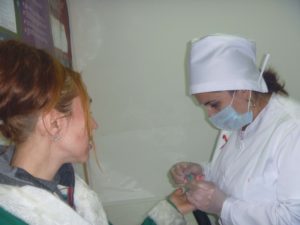
Author: Nargis Hamrabaeva, Tajikistan
Several more cities in Tajikistan – Dushanbe, Kulob and Khujand – opened their first voluntary counselling and testing (VCT) points in three civil society organisations – Vita, SVON Plus and Amali Nek.
Opening the VCT points, training the medical staff, renovating the premises and procuring the necessary furniture and equipment became possible thanks to the Bridging the Gaps: Health and Rights for Key Populations project and consultations with the AFEW-Tajikistan specialists.
VCT points are in demand
The first VCT point was opened in December 2016 in the southern part of the country, in Qurghonteppa in the representative office of AFEW-Tajikistan in Khatlon region.
“This initiative was a success and several NGOs contacted us asking to support the opening of similar facilities. People who live in small towns and villages all know each other and may be vulnerable, so such points are in high demand,” says Zarina Davlyatova, AFEW-Tajikistan project manager.
Ismoil (27 years old), a former drug user with a five-year history of drug use was recently able to “quit” his past and is now trying to start a new life. He was one of the first people tested for HIV in one of the NGOs.
“It is easy, fast, free of charge and confidential. The staff is very friendly. I could not make myself go to the AIDS centre but I am ready to come back to this place,” the young man is saying.
Trust is the key
According to Nasim Fayzov, project coordinator at SVON Plus NGO, such facilities are one of the best options to cover as many members of the key populations – people who use drugs, sex workers, ex-prisoners – as possible with HIV testing.
“In rapid testing points people do not feel any discomfort or stigma. Besides, members of the key populations can get a number of services at one place. For instance, people who use drugs may get tested for HIV, receive a consultation and get disposable syringes,” tells Nasim.
Two trained staff members with medical background work in the VCT point.
Since the facility at the SVON Plus NGO was opened, about 50 people got tested for HIV there. Six people were tested in the VCT point at the Vita NGO in Dushanbe. Director of the NGO Eraj Nazarov says that they share information about the newly opened facility with program participants and volunteers so that more members of the high-risk populations can hear about it.
The third VCT counselling point was opened in the premises of Khujand-based Amali Nek NGO.
“The key is trust. No money can buy it. Members of the key populations trust us, probably because we use a client-oriented approach in our work,” says the director of Amali Nek NGO.
According to the Republican AIDS Centre, the total number of people living with HIV in Tajikistan is almost 10 thousand persons, among them 1,207 cases were diagnosed in 2017.
We would like to recall that the issue of countering HIV-related stigma and discrimination will be one of the main topics of the XXII International AIDS Conference (AIDS 2018) to be held in Amsterdam in July 2018.



